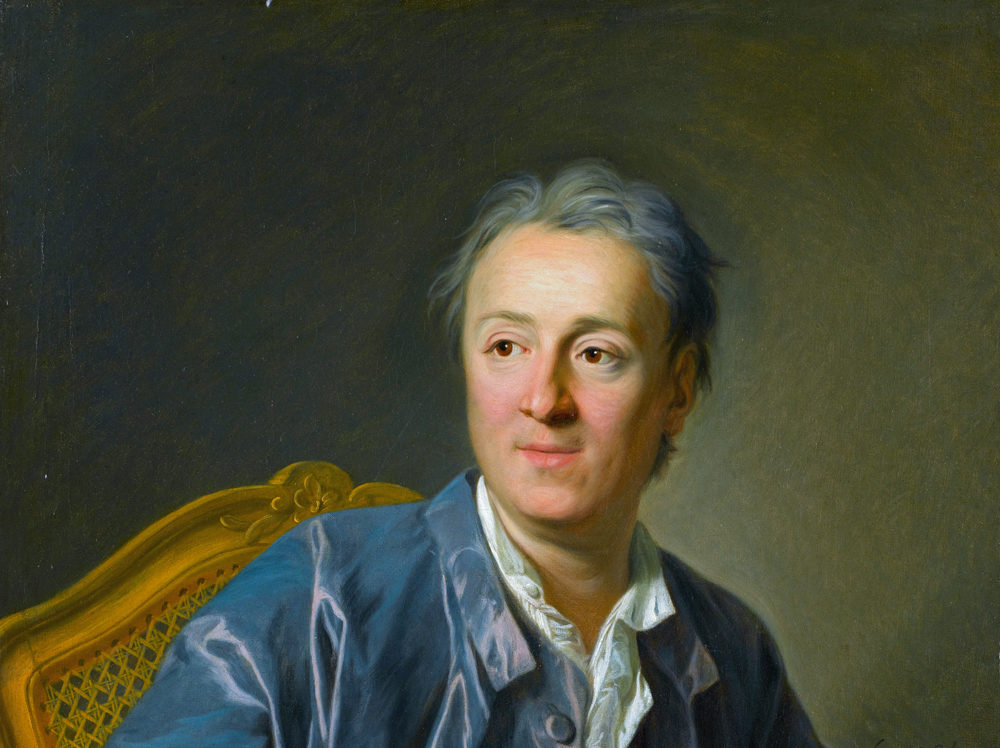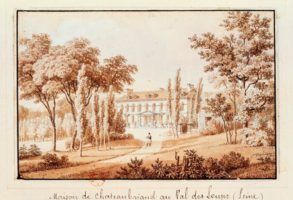
Published April 19, 2019
National Review - April 22, 2019 issue
Review: Diderot and the Art of Thinking Freely, by Andrew S. Curran (Other Press, 528 pp., $28.95)
One hates to restate the obvious, but some matters require to be repeated until their dire significance really sinks in. Intellectual freedom and diversity are in danger of being expunged. Formerly respectable universities have become the province of a mentally barren professoriate indoctrinating new generations of virtuecrats, who have no room in their minds for any thoughts that might defy the latest orthodoxy. The outlook is grim, rich possibilities are being foreclosed, and the past masters who formed our civilization have become objects of loathing, not to be spoken of without scorn.
So one is grateful for small mercies, and this praiseful new intellectual biography of the French philosophe Denis Diderot (1713–1784) offers hope that serious engagement with the past is still possible in the academy. Andrew S. Curran, a professor in the humanities at Wesleyan University, honors a thinker who sought to free his fellow men from ecclesiastical and political oppression by force of mind alone, who succeeded in that project more completely than he would ever know, yet who was so thoroughly a philosopher that he subjected even his cherished utopian ideas to a probing examination and found them wanting.
One of the most notorious atheists of his time originally wanted to become a priest. Diderot attended a Jesuit school in his home town of Langres, then another in Paris, and studied for three years at the Sorbonne, the theological college in the University of Paris. He never did explain just why he rejected the religious life at 22, but Curran speculates that “this increasingly skeptical thinker would have become exasperated among a sea of aspiring ecclesiastics, all engaged in scholasticism’s impenetrable debates.”
The only authority Diderot would come to accept was his own mind, which he stocked with a superabundance of knowledge and refined to a pitiless lucidity. He turned to the elucidation and propagation of a faith that all could understand and embrace: the Enlightenment cult of reason, which he believed would herald an epoch of unprecedented prosperity, equality, social harmony, and individual freedom — nothing less than universal happiness. The Encyclopédie, under his editorial direction, would be the summa of the new dispensation. It would carry on the work of discovering and publicizing the truth about the world and man’s place in it that had been begun by Francis Bacon, Isaac Newton, and John Locke. From 1749 to 1772, Diderot oversaw some 150 writers and 14 engravers and painters who contributed to the 17 volumes of text and eleven of plates, and he turned out 7,000 entries of his own, in performing the philosophe’s stated duty to “trample underfoot prejudice, tradition, antiquity, shared covenants, authority — in a word, everything that controls the mind of the common herd.” The established authorities of church and crown resisted. In 1752 and again in 1759, the Encyclopédie was suppressed by order of the king; the pope for his part threatened its readers with excommunication. The liberating work continued, however, with the help of sympathetic government officials. It would be the book that defined the Age of Reason.
For Diderot, Enlightenment reason meant the end of traditional religion. He turned his severe searchlight on all its forms. Reflection on the problem of evil upended any belief he might once have had in an omnipotent and benevolent God, and the often murderous contention among the various faiths proved the power of unreasoning hatred behind the professions of pious certainty. Confident that he possessed the truth about the godless, uncreated, purely material universe, nevertheless he acknowledged the need for tolerance in matters of faith. Such tolerance owed more to prudence than to humility. The time had not yet come for the widespread acceptance of the truths Diderot held to be self-evident, or at least plain enough to the thinking person. As Immanuel Kant would declare in the 1784 essay “What Is Enlightenment?”: Theirs was an age of enlightenment but not an enlightened age. Until all were enlightened and would know better than to believe in the unbelievable, Diderot thought it best to subscribe to what Curran calls “moderate humanism.” Diderot lived for the truth, but he preferred not to suffer for it. As long as the philosophes represented a decided minority view, a certain delicacy of expression was called for. The 102 days he spent in prison at the age of 36 for his early writings, which were indiscreetly infidel, had taught him the virtue of politic reticence. The warning that recidivism might mean a life sentence convinced him to save his most daring thoughts for his desk drawer, his intimate circle of friends, and posterity. “Posterity is to the philosophe as heaven is to the man of religion,” he wrote.
In the name of reason and nature, he had a flair for the outrageous that he was wise not to indulge with publication during his lifetime. In D’Alembert’s Dream, a learned physician soberly teaches an elegant bluestocking that anything possible in nature must be perfectly natural, including bestiality, and they discuss the advantages and disadvantages of breeding goat-men. In the Supplement to Bougainville’s Voyage, a seminal text of multiculturalism, robust Tahitian sexuality, which smiles on promiscuity and incest, is presented as a rational alternative to debilitating European morality, which promotes wedded misery and the unnatural abomination of priestly celibacy. As an art critic surveying the annual exhibitions of the Royal Academy of Painting and Sculpture — these Salons were published as they were written — Diderot insisted that our bodily nature be given its due (and notice the deft conflation of pagan and Christian beliefs that places both on the level of incredible mythology): “Remember that, although the ambrosia which intoxicated the pagan gods was a very light drink, and the beatific vision which those happy folk fed with such delight was very airy nourishment, there do still exist chubby, fleshy, fat, solid and plump creatures, and that Ganymede’s buttocks and the Virgin Mary’s breasts have to be just as nice to get hold of as those of any catamite, or any trollop, in this wicked world.”
Perhaps Diderot’s boldest stroke was to call in doubt his own monumental contribution to Enlightenment philosophy. His brilliant dialogue Rameau’s Nephew, antic, astringent, and ultimately desolating, presents the philosopher in conversation with the black-sheep nephew of the leading French composer of the time. The nephew finds satisfaction and amusement in various sorts of degradation: He eulogizes an appalling view of human nature, drawn from his own nature, based on raging appetite, unapologetic greed, and imperious self-interest. That the nephew should be so volubly forthcoming about his compulsions and his rationales for acting on them distresses the philosopher, who must admit that he and the rest of us have thought and felt the same shameful things but would never come out and say so. He is especially disgusted by the sardonic gaiety with which the nephew relates the tale of a man who befriends a Jew so that he can fatally denounce him to the Inquisition and swindle him out of his fortune. Curran is mostly right in saying that “this text repudiates [Diderot’s] own role as le philosophe, not to mention the power and the authority of reason and philosophy itself” — though “undercuts” would be a better word here than “repudiates.” The dialogue does demonstrate the difficulty, not to say the impossibility, of realizing the Enlightenment project: Intransigent humanity, capable of despising itself but incapable of changing for the better, refuses to be shaped in accordance with reason and virtue. There will always be men like the nephew who have no use for what the philosopher has to teach them. That does not mean that the philosopher is not the wisest and best of men. Diderot never repudiated his own extraordinary nature.
What would Diderot have to say if he were presented with the condition of the posterity he wrote for? How would Curran’s “moderate humanist” fit in the intellectual life of our time? Curran appears to believe that this moderation was the genuine expression of Diderot’s temperament rather than a survival strategy that enabled him to say all he could without saying more than was good for him. But Diderot was an atheist true believer who prudently dissembled to save his skin. His rightful descendants today are those cocksure that they are making ours an enlightened age, as Kant understood the term, and who intend to stamp the social order with their imprimatur. What sustains a liberal society is the general acknowledgment that no one is likely to possess the whole truth and that one might be wrong even in one’s cherished beliefs; what drives the progressive oppression is the certainty that one is right about every important matter and that unbelievers are not just mistaken but pernicious.
Since Diderot’s time, and under his influence, “the mind of the common herd” has changed its allegiance but not its nature. The contemporary cultists of reason believe that they fully understand the world and are morally obliged to change it. From their point of view, those standing athwart history and yelling Stop now occupy the unfortunate position once held by Rameau’s nephew — refractory, dishonorable, perverse. But it is in fact among these that one might hope to find any true philosophers living today.
This article appears as “Our Diderot” in the April 22, 2019, print edition of National Review.
Algis Valiunas is a fellow at the Ethics and Public Policy Center and a contributing editor of The New Atlantis.








